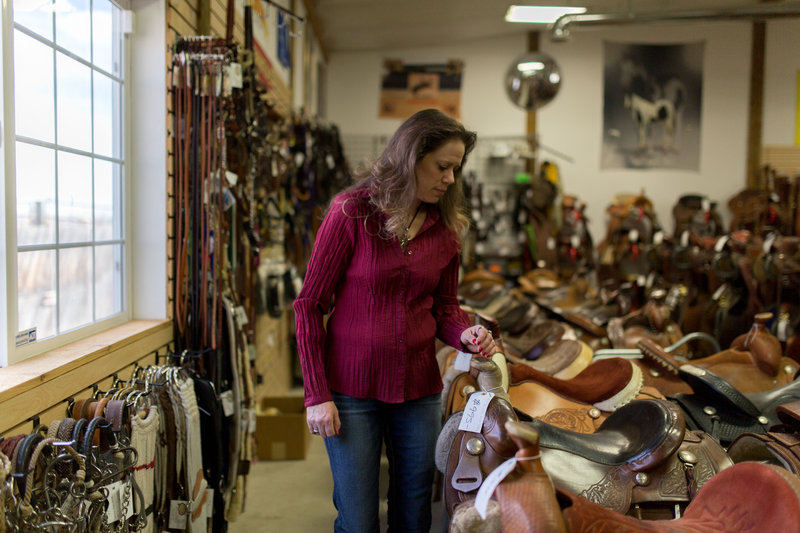SaddleUp’s Danna Golden took her brick and mortar business online via eBay in 2013, helping double her sales by expanding her customer base well beyond Longmont, Colorado.
Trade and technology, two hallmarks of our global economy, are often blamed for exacerbating divisions between the haves and have-nots. This often takes on a distinct geographic hue, with a few economic big city hot spots increasingly overshadowing remote and rural areas often characterized by fewer opportunities. The Brookings Institution’s Mark Muro and Joseph Parilla, for example, report on a “city productivity gap” and the emergence of a few “superstar” metros. And a recent New York Times cover story on the economy of Johnstown, PA, paints trade and the Internet as a one-two punch, with ecommerce undermining retail jobs in a local economy already decimated by the loss of factory jobs.
eBay Fosters Geographic Inclusion
eBay connects millions of buyers and sellers around the world. We believe that when cutting-edge technology tools are put to work empowering independent local retail entrepreneurs, it helps turn the tide in small and perhaps disadvantaged communities. We call this “Geographic Inclusion,” giving everyone an opportunity to take part directly in the global economy, whether in a coastal boomtown or the more depressed rust belt. Internet-enabled small businesses grow their businesses by exporting to other states and countries, create jobs and build community. The eBay Public Policy Lab released a report earlier this year titled Platform-Enabled Small Businesses and the Geography of Recovery that showed new Commercial Sellers on eBay ($10,000 USD or more in annual sales) emerged during the recent economic recovery of 2010 – 2014 across a wider and more inclusive range of U.S. counties than new enterprises grew in the U.S. economy overall.
Most Business Growth Confined Largely to Metro Hotspots
The eBay research built upon a 2016 report of the Economic Innovation Group (EIG) that examined the concentration of net establishment growth in the U.S. over the last three economic recoveries. One of the most publicized findings was that half of all the net establishment growth in the U.S. in the period from 2010 – 2014 was confined to just 20 U.S. mega-counties. Just as disappointing was the fact that those 20 growth counties were located in just 7 states, and that there was no net enterprise growth at all in all the counties in the U.S. with fewer than 100,000 inhabitants. This meant zero net enterprise growth in much of rural America.
eBay Business Seller Growth Balanced Across the Country
The story of eBay Commercial Sellers from 2010-2014 showed a more geographically inclusive spread of new enterprise formation on eBay compared to the brick- and-mortar economy. The side by side is striking – half the net increase in eBay Commercial Sellers came from 75 counties spread across 24 states, rather than the 20 counties in only 7 states for the overall economy. The geographic distribution of the 75 counties in the eBay results – which touches nearly every region of the country – more closely mirrors the net enterprise growth in the U.S. recoveries of the early 90s and 2000s.
When we looked at the more than 3,100 counties across America, nearly 75 percent of counties saw a net increase in their number of eBay Commercial Sellers, while only 41 percent of counties saw an increase in their number of traditional business establishments. It is key to note that every one of the 20 mega counties that saw the greatest business growth in the traditional economy also saw very robust growth among eBay small businesses. But the eBay growth was not so limited to the traditional economy hot spots; it was more balanced across the country as a whole.
eBay SMBs Emerging in Smaller, More Remote and Rural Areas
The EIG analysis showed that 58% of net new firms were in counties with more than 1 million inhabitants. On eBay, only 38% of eBay small businesses were in the giant counties. That difference, a 20% share of the growth, was distributed among the vastly larger number of smaller counties. The other end of the county spectrum is even more striking. There was zero net new firm growth in the traditional economy if you combine all the counties with 100,000 or fewer Americans - that’s over 2,500 counties with zero net growth. On eBay, 12% of new eBay small enterprises emerged in those smaller, mostly remote and more rural locales. That’s geographic inclusion.
Technology-Enabled Independent Businesses Create Economic Opportunity
Many people have valid concerns that economic opportunity is not available to enough Americans. eBay's technology serves the needs of independent small businesses and entrepreneurs, connecting them to a world of consumers, and allowing them to tap into commercial opportunities in growth regions across the country and around the world. The result is greater growth and a more inclusive economy.
 Editor's Note: This article originally appears on Marie Oh Huber's Linkedin page.
Editor's Note: This article originally appears on Marie Oh Huber's Linkedin page.



